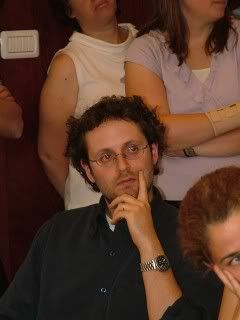Olim (immigrants) to Israel often describe their new country as a place they hate to live in but could never bare living anywhere else. How many others can say the same thing about their own State?
Friday saw the continuing saga of our car (purchased 2001) that was in for its second full automatic gear replacement in the last 6 months. The car has been no end of trouble (and expense) since its purchase some 4 years ago. The well-respected (?) European car makers at first demanded we pay 13000 shekels for fixing the gear problem - that is, until we roped in a lawyer.
Anyway, two days ago we received our car back (with working gearbox) and a little extra gift - a ripped hole in the upholstery of the front passenger seat. Of course I immediately notified those in charge. Their reponse - "not our responsibility - of course it must have been there before - maybe your baby seat caused it - what do you want from me?"
Lovely! Just beautiful! What does one do with such people?
So why am I telling you this story? Well it's part of the KICview - that is, KIC sessions look at Israeli society as well as politics, disengagement and things that go bang in the night.
Tomorrow I am starting my weekly Current Affairs sessions with my fifth group of olim at Ulpan Etzion. In the past, I have raised these 'difficult Israeli experiences' with my students and it does help them integrate into society and to see Israel as it really is, outside the youth movement and the Aliyah brochure.
So what's the problem? The problem is that on Friday night I discovered the man from the car business sitting in front of me in shule. Having had a heated exchange 6 hours earlier, this raised some great discomfort.
This is Israel in its truest and most frightening reality! Israel does have a famous amount of opportunities for arguing and yelling at people in the street, in the government office, in your car, at the supermarket... everywhere! It's a horrific situation whereby the person you gave a quick abusive driving lesson to hours earlier, ends up being the mohel (person who circumcizes)at your nephew's brit milah (circumcision) or the man who runs the bakery down the street. And worst of all, the stresses and personalities in this country, lead you to unattractive and purely horrific confrontations with fellow Jews. (Not that confrontations with a non-Jew are any better but I'm sure you understand my feelings).
How do you separate between the man who is quite clearly misleading you at the car business and the man who sits with you in shule? I've always said that Israel might be a much better place if there were no Jews here. Ironic, crazy to say, but well...
I am not sure whether a solution to this dilemma exists but a recent article from A.B.Yehoshua gave me some direction and comfort. In essence he expressed his satisfaction with the fact that in Israel all Jews of all backgrounds are forced to interact one with the other. In his opinion, this positive phenomenon does not exist in the Diaspora.
That is, in most Diaspora comunities, Reform, Secular, Conservative, Orthodox and Chareidi communities barely ever interact. They have their shule, their families and their communities and that's where it stops. On the other hand, Yehoshua argues that Israel is brimful with such important interaction. Though the "most people are Jewish syndrome" can lead to absolute frustration (as I pointed out above), Israel allows for an opening of doors and a building of bridges. In light of this and the existence of a thorough Jewish reality here, he argues that the Israeli Jew is the "Complete Jew".
You see - in Israel (in most cases), the man giving you a parking ticket is Jewish and so is your dentist, your doctor, your optometrist, your lawyer, your accountant and your dog's vet. The policemen are Jewish, so are the local council representatives, the bank tellers, cafe waiters, taxi drivers, bus drivers and rubbish collectors. There is no avoiding interaction with Jews who identify differently with Judaism than you do. All those listed above come from all sectors of Jewish life - secular and religious (at all different levels), Ashkenazi & Sephardi (from all the different countries), left and right wing (in all different respects) and so on and so forth. Daily life makes Israeli Jews talk to one another and this helps to build a sense of acceptance and understanding.
Last week, I was in the Knesset for a Select Committee hearing on a new law. It was then that A.B. Yehoshua's words came flooding back to me. Here we had a Shinui MK chairing the meeting and around him sat Jews of all kinds - some with black or colored kippot and everything over and above and in-between. Only in Israel do Jews willingly come together every day to sit together, discuss and debate together and to enjoy humor together when it arises. At the end of the day, they make law together.
There is a great deal of tension in our homeland and alot of improvement to achieve yet. For sure, service (even of cars!) is lacking and at times unbearable. And yet, in Israel we do interact one with the other. We can not avoid the fellow Jew. He may not go to my shule (or any shule at all) but I'll still be interacting with him and talking to him. It's an Israeli fact to cherish and one well worth maintaining.
Any thoughts? Add a comment below...
Sunday, July 17, 2005
Subscribe to:
Post Comments (Atom)


1 comment:
I really appreciate people like you who take their chance in such an excellent way to give an impression on certain topics. Thanks for having me here.
Post a Comment